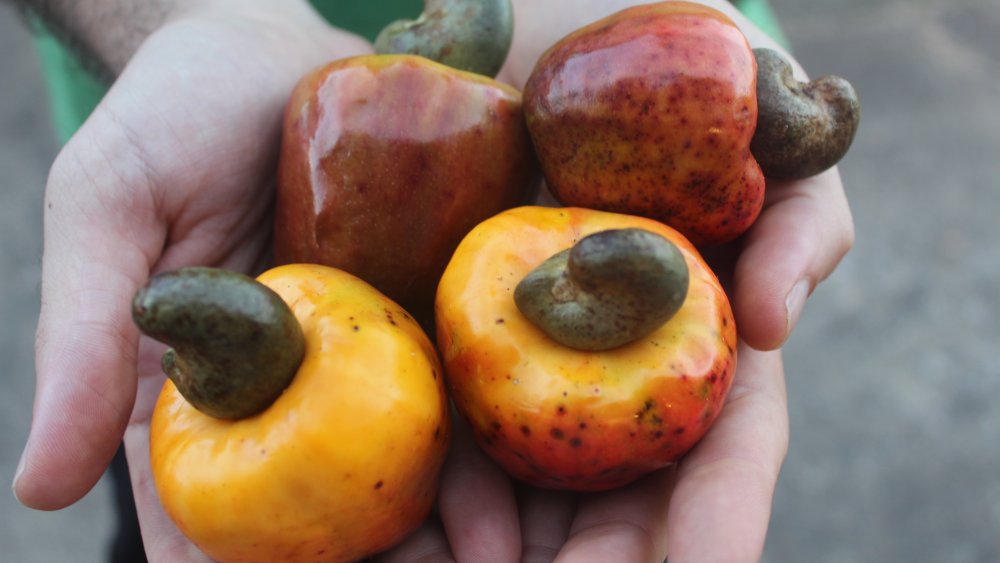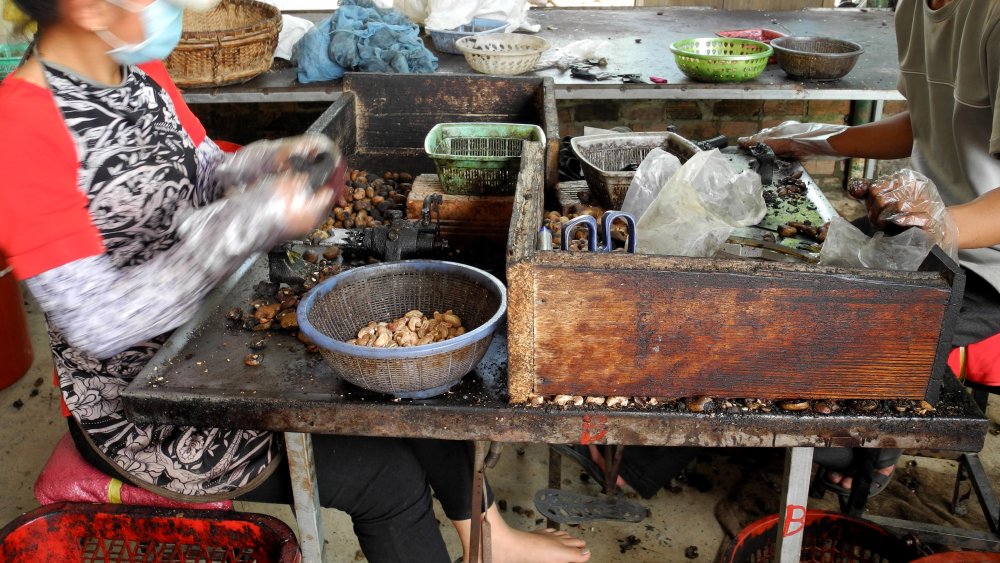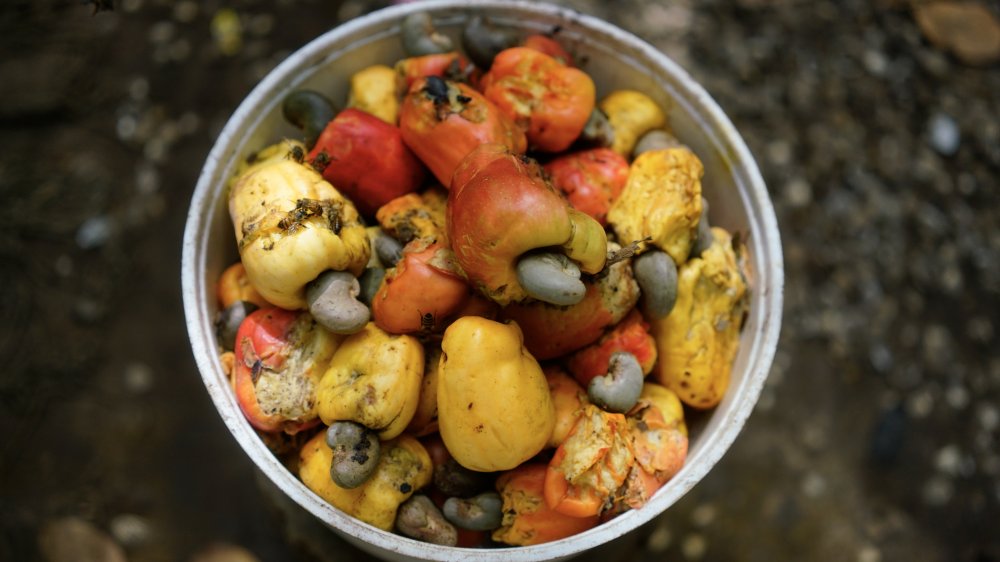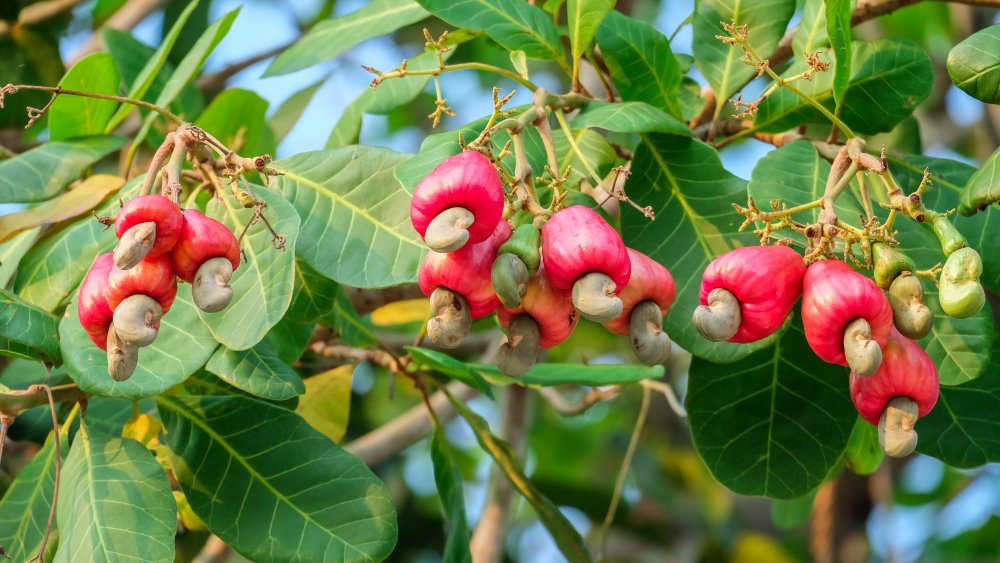Why You Should Think Twice About Eating Cashews
Remember when cashews broke the internet? Twitter could not get over the fact that the delicious nuts are grown inside cashew apples (via Insider). You, of course, buy them sans-shell. That's part of the reason that cashews are so expensive. But the harvesting process for cashews is not only time and labor-intensive, it is also toxic. Cashews, it turns out, are like poison ivy and poison sumac. They can cause hyper-pigmented skin lesions and toxic hepatitis (via The Indian Journal of Critical Care Medicine). To make them safe for us to eat, cashew harvesters dry the nuts, remove them from their shell, and steam or roast them.
Here is the problem: According to the Trade for Development Centre, only 3 percent of cashew nuts sold on world markets are Fair Trade Certified. And a Human Rights Watch report documents how many cashew harvesters are forced to work for misery wages, and in extremely precarious conditions. Safety equipment to protect against cashew toxins? They have to pay for it, when available.
Cashews are undoubtedly healthy for you. They are high in protein and good for your skin, your bones, and your hair (via Spoon University). But at what cost?
The hard truth behind blood cashews in Vietnam
Vietnamese cashew farms were the first to come under scrutiny. A 2011 Human Rights Watch report found workers at "drug rehabilitation centers" forced to harvest between roughly 4,800 nuts a day for under $3 a month as part of their "therapy." Workers suffered hand burns, respiratory problems, and other allergic reactions as a result of working with the cashews. Punishments for slow work, refusal to work, or breaking any "rules" unbelievably included beatings, sometimes with electrical batons.
A 2018 investigation by Ethical Trading Initiative Norway uncovered more disturbing trends. There are instances of child labor on these farms. Second, while international scrutiny forces big export companies to uphold certain labor rights laws, they often rely on subcontractors for labor. Subcontractors do not respond to the same standards, and cashew harvesters employed by subcontractors work long hours without benefits and with very limited safety training. Third, many cashew farms fail to use safe levels of pesticides and herbicides. Even when they do, these pesticides and herbicides often spill into waterways, contaminating the water wells in local communities.
Cashew harvesting as a women's rights issue
Raw cashews are produced not only in Vietnam, but India, Cambodia and also, notably, West African countries (via Belgian Trade For Development Centre). This raises the question: Are working conditions for cashew harvesters better in other parts of the world? Sadly, the short answer is probably not.
Verité, for example, has found young children harvesting cashews in Africa. And in 2019, an Action Aid investigation found women in India harvesting cashews, without safety equipment, for pitiful wages. Like in Vietnam, Action Aid's report documented respiratory and skin complications among Indian cashew harvesters, the majority of whom are women, because they compose most of the workforce.
Even more troubling is that, according to a report published in Agronomy for Sustainable Development, these women workers are often left unprotected by labor legislation, and therefore receive lower wages, and work in more dangerous conditions than men. These conditions are sometimes so dire that they affect the workers' reproductive health.
Does buying Fairtrade certified actually help?
If you are a cashew lover, you're undoubtedly wondering whether there is still a way to eat cashews ethically. One way to do so might be to find and buy Fairtrade certified nuts. As Fair Trade Canada explains, Fairtrade certification requires that cashew workers be paid fair wages. It also stipulates certain safety precautions that protect worker's health, including having workers coat their hands in vegetable oil to prevent burns.
Fairtrade certification, of course, is not without its pitfalls. For one, it may be difficult to find Fair Trade certified cashews. As the Belgian Trade For Development Centre reports, in 2018, there were only 12 certified Fair Trade cashew producers in all of Asia.
For two, there are also serious questions about how effective a Fairtrade certification actually is. While, in theory, working conditions on a Fairtrade farm are monitored by a third party, in 2016 The Guardian reported that this does not guarantee that workers will not be paid poverty wages. This report backs up a 2014 SOAS University London investigation which found that workers on Fairtrade certified farms in Uganda and Ethiopia had, in fact, no access to community facilities such as schools, health clinics, and sanitary facilities that Fairtrade International supposedly contributed to. Furthermore, they were furthermore paid lower wages than on other farms.



